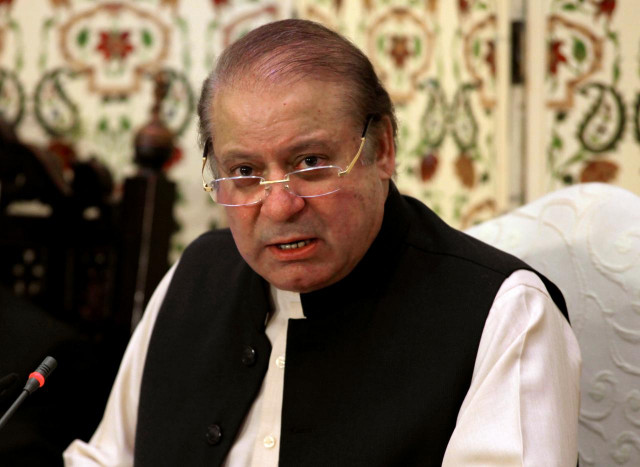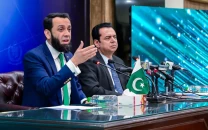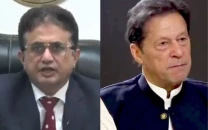Sharif gets six-week medical relief
Former PM released from Kot Lakhpat jail after SC accepts plea for treatment from doctor of choice within country

Former Premier Nawaz Sharif. PHOTO; FILE
The court accepted Sharif's petition wherein he had challenged the Islamabad High Court's (IHC) decision to deny him bail.
Sharif is serving a seven-year sentence imposed last year for failing to disclose the source of income that allowed him to acquire the Al-Azizia Steel Mills in Saudi Arabia.
The court granted bail to the former prime minister on medical grounds against two surety bonds of Rs5 million each, which will be submitted before the additional registrar.
"The sentence of the petitioner handed down by the Accountability Court-II, Islamabad in Reference No. 19 of 2017 in respect of an offence under section 9(a)(v) read with section 14(c) of the National Accountability Ordinance, 1999 is suspended and he is admitted to bail for a period of six weeks from the date of his release as a consequence of this order," read the written order issued by a three-judge bench headed by Chief Justice Asif Saeed Khosa and comprising Justice Syed Sajjad Ali Shah and Justice Yahya Afrdi.
Sharif will not leave or be allowed to leave the country during the six-week period.
The former prime minister will have to surrender himself to prison authorities once the bail period is over. If he fails to surrender, he will be arrested.
The court further clarified Sharif would not surrender before a court with an application for bail.
If during the six-week period, the appeal filed by Sharif before the IHC is finally decided, his custody will thereafter be regulated through an order of the high court.
The hearing continued for over two hours. The chief justice was visibly not convinced to grant bail to Sharif, observing that no report suggested that the former prime minister's life was in danger due to any ailment.
However, Sharif's lawyer Khawaja Haris was able to convince other judges of the bench to grant bail for a limited period.
Later the judges left for their chamber for deliberations and announced the verdict after an hour.
The Sharif family's legal team claims that written order is slightly different that that announced in the court.
The bench had announced that if Sharif needed further treatment, he could move the relevant high court for a fresh bail on medical grounds but this has not been mentioned in the written order.
A larger numbers of Pakistan Muslim League-Nawaz (PML-N) leaders were present in the courtroom to witness the proceedings.
Sharif's counsel Advocate Khawaja Haris submitted his client's medical reports to the court.
He prayed to the court that Sharif's sentence be suspended for a period of eight weeks so that he could be provided with an opportunity to avail proper medical treatment of his choice. After the expiry of the period, he added, his client would voluntarily surrender himself to custody.
The additional prosecutor-general appearing on behalf of the National Accountability Bureau opposed the petition maintaining that Sharif was a convicted prisoner and already being provided the best medical treatment and facilities available in the country.
The chief justice asked Haris if he had submitted an additional document to the court.
The counsel responded that he had submitted a letter written by Dr Lawrence to Sharif's personal physician Dr Adnan.
The chief justice raised questions about legal status of the letter, noting that it was written by one private individual to another and it was not addressed to the court.
He also asked Haris as to how could the court determine the authenticity of the letter, which was being presented as evidence.
Haris responded that he was not solely depending on the letter in the case. He said the former prime minster was suffering from heart disease and required an angiography.
He further told the court that his client's blood sugar level and blood pressure needed to be monitored constantly.
Besides, he added, Sharif was also suffering from kidney disease which was in its third stage, and his client needed dialysis if it advanced to the fourth stage.
Justice Khosa asked Haris if he had any other proof of Sharif's deteriorating health apart from Dr Lawrence's letter.
He questioned whether all that the court had as evidence was Dr Lawrence's letter and if it was enough to be considered proof in a criminal case.
Sharif's counsel informed the court that five medical boards had been formed to examine his client's medical condition and each one had declared that the former prime minister's kidney disease was at its third stage.
They had also recommended that he should be admitted to a hospital, he added.
Haris told the court that Sharif had been diagnosed with angina and that he had already suffered two attacks. He maintained that his client's health had deteriorated in prison.
The chief justice observed that Sharif had been suffering from these medical conditions for several years but still managed to maintain an active lifestyle. He remarked that the court had already reviewed Sharif's medical reports that were submitted earlier.
The bench observed that Sharif's deteriorating health and illness were the only grounds for the suspension of his sentence and the recommendations of the medical board outweighed the importance of the letter.
"The medical reports of the petitioner brought on the record of the case do suggest that he has a long history of various ailments including cardiac complications, kidney problem, hypertension and diabetes," the written order read.
The bench observed that some of the reports prepared by the medical boards and available on the record clearly recommended that "the patient's current symptoms necessitate coronary angiography, after nephrologist clearance" and that the patient needed "cardiac catheterization, for further management, in view of his symptoms of angina".
"In this peculiar backdrop, and extending due deference to the consistent medical opinion of senior doctors available on the record, the prayer made by the learned counsel for the petitioner regarding admission of the petitioner to bail upon suspension of his sentence for a limited period has been found by us to be reasonable," the order read.
While commenting on the Supreme Court decision, Advocate Faisal Siddiqui said the judgment had proved the PML-N propaganda directed against the top court false as the former prime minister's sentence had been suspended by a bench headed by the chief justice.
[sc name="Civil Petition No 639 of 2019"]
With additional input from APP



















COMMENTS
Comments are moderated and generally will be posted if they are on-topic and not abusive.
For more information, please see our Comments FAQ